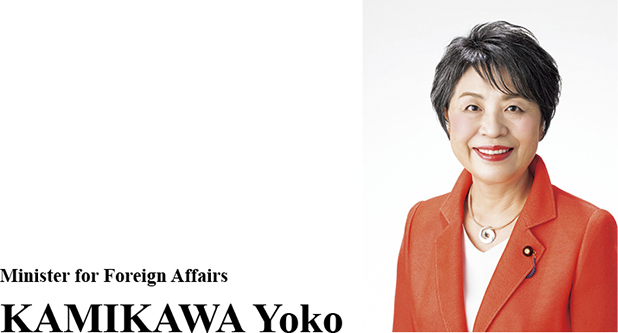Foreword
The world is now at history’s turning point. While the international community faces compound crises such as Russia’s aggression against Ukraine, the situation in the Middle East, and global challenges including climate change and infectious diseases, the importance of developing and emerging countries called the “Global South” is increasing.
As a responsible major power, Japan must maintain and strengthen its advocacy for the free and open international order based on the rule of law so that all people can enjoy peace. We must pursue diplomacy to realize a safe and secure world where human dignity is protected based on the SDGs principle of “leaving no one behind.”
To this end, it is critical to implement ODA, one of the most important tools of diplomacy, in a more strategic and effective manner. In June 2023, Japan revised the Development Cooperation Charter for the first time in eight years, declaring our commitment to promoting ODA that contributes to both resolving the challenges of developing countries and realizing Japan’s national interests, such as socio-economic growth, by the “co-creation” of social value through dialogue and collaboration with developing countries.
2024 marks the 70th anniversary of Japan’s ODA. In implementing ODA, I will focus on the following three key areas to contribute to both the peace and prosperity of the international community and the realization of Japan’s national interests.
The first is to advance efforts to achieve “quality growth” in the new era. Under the new Development Cooperation Charter, Japan will launch the “Co-creation for common agenda initiative,” which proposes attractive cooperation menus that leverage Japan’s strengths, and initiate ODA that mobilizes private-sector funds. By further promoting public-private partnership, we aim to achieve quality growth in developing countries, while resolving Japan’s challenges and promoting our economic growth.
The second is to contribute to the sustainable development of a free and open world. As part of our ODA efforts to promote the new plan for a “Free and Open Indo-Pacific (FOIP),” Japan will strive to support the development of legal and judicial systems, peacebuilding, the enhancement of connectivity, and the realization of resilience, sustainability, and other matters. Japan is firmly committed to not allowing any attempts to change the status quo by force or coercion, and to maintaining and strengthening a free and open international order based on the rule of law. To demonstrate this commitment, Japan will continue to provide a wide range of support to Ukraine and its neighboring countries, utilizing the outcomes of the Japan-Ukraine Conference for Promotion of Economic Growth and Reconstruction. Furthermore, Japan will provide swift assistance to people in vulnerable situations, including the humanitarian crisis in the Gaza Strip.
The third is to lead international efforts to address increasingly complex and serious global challenges. Based on the concept of human security, Japan will steadfastly address areas such as food and energy, climate change and the environment, global health, refugees and displaced persons, and Women, Peace and Security (WPS), aiming for the resolution of challenges facing all humankind and the achievement of the SDGs. The international trust that Japan has fostered through human-centered development cooperation is an important asset and the driving force for Japan’s diplomatic capability. Leveraging this trust, Japan will promote our own style of fine-tuned development cooperation to protect “human dignity,” while standing with vulnerable countries facing various challenges. In doing so, Japan will make strong and rapid efforts through strategic and agile utilization of bilateral cooperation and contributions to international organizations.
In order to vigorously advance these efforts, it is also essential not only to utilize ODA more strategically and effectively, but also to expand and strengthen its foundation, in light of the changes of era. At the same time, it goes without saying that ODA, funded by public resources, is a diplomatic tool supported by the understanding and cooperation of the people of Japan. We will sincerely explain to the people how ODA contributes to ensuring the peace and stability of the citizens, maintaining their daily lives, and promoting Japan’s economic growth. To maximize the development effects of ODA, we will further strengthen cooperation for solidarity with private companies, public financial institutions, international organizations, NGOs, local governments, and other relevant partners. The entire world, including Japan, is interconnected. Contributing more actively to building a peaceful, stable, and prosperous international society under a free and open order through development cooperation directly leads to Japan’s national interests.
The White Paper on Development Cooperation 2023 reports on the implementation status of Japan’s development cooperation over the past year to the people of Japan. Gaining the understanding and support of the public is essential for the implementation of development cooperation, and we will sincerely listen to the voices of the public and strive to carry it out more strategically and effectively. I hope that this White Paper will be read by as many people as possible and that it will help deepen people’s understanding of Japan’s development cooperation efforts and their significance.
March 2024

